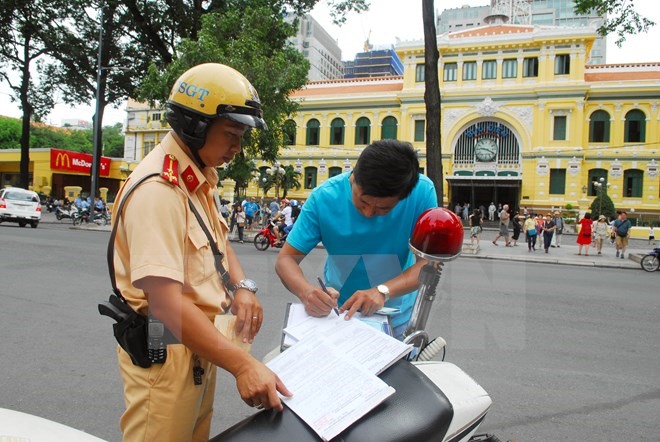 Society
Society

Traffic police and authorities in HCM City are concerned about low road safety awareness of road users, which results in a large number of traffic accidents in the city.
 |
| A police officer deals with a traffic violator at Công Xã Paris Square in central HCM City. — VNA/VNS Photo Mạnh Linh |
HCM CITY — Traffic police and authorities in HCM City are concerned about low road safety awareness of road users, which results in a large number of traffic accidents in the city.
The most common traffic violations are speeding, drunk driving, driving in the wrong direction, driving in the wrong lane, talking on the phone while driving, and driving side by side, according to Lieutenant Colonel Nguyễn Văn Cường, head of the division’s accident investigation and traffic team.
Low awareness and wrong behaviours on road safety cannot be altered by persuasion alone, but require tough measures and large fines, he told the Tuổi Trẻ (Youth) newspaper.
Brigadier Trần Sơn, former deputy head of the law enforcement and traffic investigation under the Ministry of Public Security, is also concerned about low road safety awareness among road users, saying they only follow traffic regulations in the presence of traffic police.
“We must aim for a higher level of traffic culture where road users voluntarily comply with traffic regulations, and such voluntary attitudes should be nurtured and developed into an unconditioned reflex,” he said at a road safety forum held in the city last Sunday. He cited a number of recent traffic accidents in which a few absent-minded seconds cost dozens of lives.
Permanent vice president of the National Traffic Safety Committee, Khuất Việt Hùng, said one of the values that should be pursued in order to create such driving culture is the willingness to obey traffic laws, especially the habit to give way to other drivers and pedestrians, Hùng said.
Data compiled by the city’s road and railway traffic police division show 173 accidents occurred last year, killing 156 people and accounting for 20 per cent of the total number of accidents in the city, the Tuổi Trẻ newspaper reported. Only two accidents were attributed to poor-quality traffic infrastructure and unsafe roads, the remaining were the result of traffic violations, the newspaper said.
Helmets and mirrors
He also advised young road users to start training themselves to comply with traffic regulations from the simplest of behaviours. “A lot of young people nowadays prefer small rearview mirrors and stylish helmets, which are unsafe for driving,” he said. “Use standard helmets, use authorised mirrors from your motorbike’s distributors, and secure them onto your motorbikes in a proper way.”
Trần Quang Lâm, deputy director of the city’s traffic department, referred to the “Vision Zero” road traffic safety project by Sweden – which aims for zero fatalities or serious injuries in road traffic 20 years from now – as an example of traffic accident prevention.
The Swedish government has assumed responsibility for the prevention of road accidents, according to Lâm, initiating actions to change drivers’ behaviours, as well as understanding the actual conditions of the country’s traffic infrastructure and citizens’ habits and level of awareness, he said.
Linking it to Việt Nam, Lâm stressed the importance of authorities’ participation and collaboration with citizens in striving for higher road safety targets.
“Road users in Europe often shake hands, smile and apologise to each other when traffic incidents happen,” he said. “It’s the job of police officers and insurance companies to determine who’s right, who’s wrong, and how to resolve the case.” — VNS




